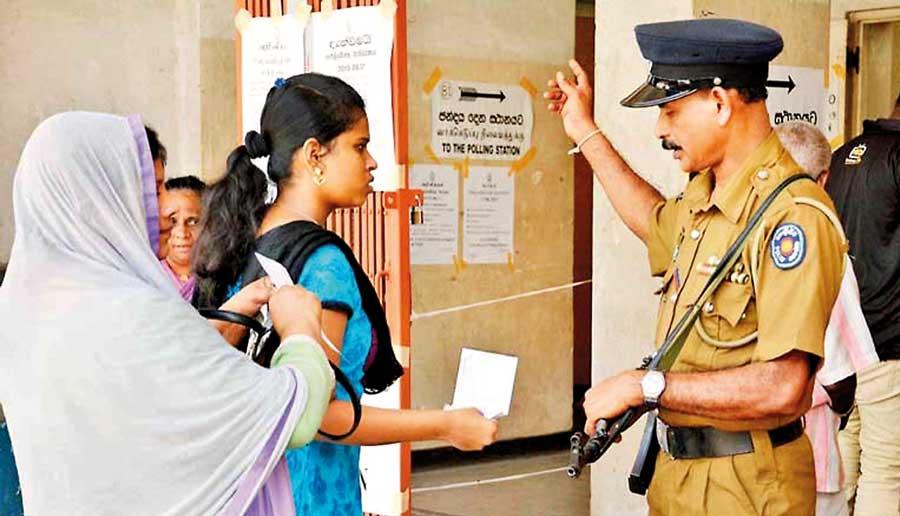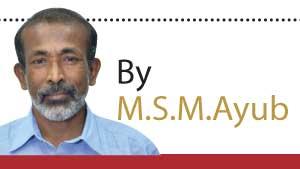Reply To:
Name - Reply Comment

A popular claim in the recent past among the people had been that all the 225 members of Parliament were rogues. Some people went on to curse them in public. And ironically, some of those Parliamentarians themselves quoted this claim during televised talk-shows pretending to assert the need to elect honest and qualified law makers to the legislature.
We cannot recall anybody challenging this view or defending the legislators of the day. However, more than 200 out of the same 225 former MPs in the last Parliament have been re- nominated to contest the August 5 Parliamentary election. Among those, are persons who were accused of perpetrating murders, conniving or defending the culprits of the Central Bank bond scam, accepting bribes from Arjun Aloysius for defending him, acting against the Constitution, damaging the property of Parliament and attacking the Speaker and other MPs during the Constitutional crisis in 2018 and many other illegal and unethical activities.
nominated to contest the August 5 Parliamentary election. Among those, are persons who were accused of perpetrating murders, conniving or defending the culprits of the Central Bank bond scam, accepting bribes from Arjun Aloysius for defending him, acting against the Constitution, damaging the property of Parliament and attacking the Speaker and other MPs during the Constitutional crisis in 2018 and many other illegal and unethical activities.
Yet, nobody is heard challenging or decrying the selection of these same people to the next Parliament as well. Instead, the country is now divided into political parties to re-elect them to the same positions. If people curse them again in a few months after the election - after the euphoria over the election victory has died down - who is to blame?
It is clear that the political culture of the country has not changed after the dissolution of Parliament by President Gotabaya Rajapaksa on March 2. Neither have those former MPs who did not challenge the allegation that all 225 of them in the last Parliament were rogues, changed. The issues that are being discussed or debated these days on election platforms do not even hint of such a change either, in many of the candidates.
"More than 200 out of the same 225 former MPs in the last Parliament have been re-nominated to contest"
The real issues affecting the lives of the people are not discussed on those platforms. Neither do they present any viable and credible plans to resolve them. They are only interested in uttering insults, invectives, substantiated or unsubstantiated allegations, shameless lying, mudslinging, demonizing others and deifying their own leaders.
The split within the United National Party (UNP), the conflict between the Sri Lanka Podujana Peramuna (SLPP) and the Sri Lanka Freedom Party (SLFP) are two main issues that figure on the election platforms of the three main parties in the fray - SLPP, UNP, and the Samagi Jana Balawegaya (SJB) led by Sajith Premadasa. These parties point fingers at each other over the terrorist attacks on three churches and three hotels on Easter Sunday last year.
Subsequent to the boastful and provocative statement made by Vinayagamoorthi Muralitharan alias Karuna Amman on June 20 that he killed 2000 to 3000 soldiers at Elephant Pass, SLPP leaders accuse the UNP and SJB of providing weapons and money to the LTTE while the leaders of those two parties in turn accuse the SLPP leaders of giving money to the LTTE to engineer a poll boycott in the North at the Presidential election in 2005.
The SLPP leaders as they had done during the past elections, lay claim to the war victory against the LTTE in 2009 while the war-time army Commander Field Marshal Sarath Fonseka who is contesting under the SJB too does the same.
This is not to say that these issues are not important or have nothing to do with the interests of the country. For instance, preventing a terrorist attack similar to the Easter Sunday carnage is extremely important and it has to be debated in every possible forum. But, the current public discourse on it is primarily aimed at demonizing Muslims and Islam, apparently to muster more support from the Sinhalese constituency, at the forthcoming election. It would not help arrest those behind the attack or directly involved in it, if any more are at large. Similarly, except for exposing the supposed level of patriotism in many people, the debate over the provocative statement made by Karuna Amman would also ultimately lead to nowhere.
Another issue which political parties accuse each other during elections is, selling of national assets to foreigners. However, in the light of the way foreigners are allowed to use lands in Hambantota, Somawathiya and Galle-Face, and facilities given such as the Eastern Terminal of the Colombo Port, one would find it difficult to see a huge difference between the parties that have so far ruled the country. SLPP leaders who promised the country not to sign the Millennium Challenge Corporation (MCC) agreement before the Presidential election, have got the proposed agreement with MCC reviewed by a panel of experts, but there is no indication that they would discard it totally as they promised the country. The soft stance they have now on offering lands in Hambantota to China is a far cry from the stand they took during the yahapalana regime.
"It is clear that the political culture of the country has not changed after the dissolution of Parliament by President Gotabaya Rajapaksa on March 2"
Both the main parties, the SLPP and the UNP boast of the development activities carried out during their tenures. The leaders of the SLPP in particular have been successful in creating an impression in the minds of the people that they had developed the country between 2005 and 2014. Yet, any student of economics knows that the development of a country is measured on social indicators, which Sri Lanka cannot boast of.
The real issues faced by the people are ignored by almost all political parties. Hundreds of thousands of people in the dry zone are suffering from lack of drinking water and irrigation water. The only time after the Independence when an effort was made to ease the problem was the implementation of the Mahaweli development schemes in the 1980s and that too was carried out by diverting a river that flows through the dry zone to another area in the same zone. Former Communist Party leader Dr. S.A.Wickramasinghe as far back as 1953 had pointed out the possibility of taking the water of rivers that wreak havoc in the wet zone during the South-West monsoon season to the dry zone where the people are hard hit by the drought.
Agricultural and industrial development is intertwined with the transformation of education. No government has launched an education system along with a corresponding development plan that would boost the economy, rather than presenting ad hoc development projects and educational reforms.And it is pointless to expect such a comprehensive action plan from a group of politicians who are hell-bent in making money through politics.